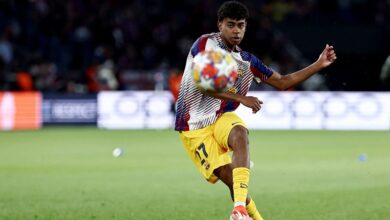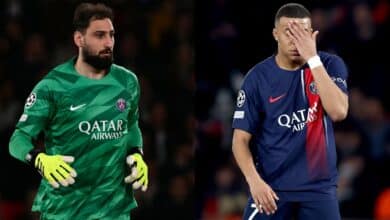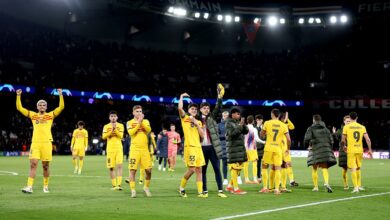Barca’s €120m lifeline before La Liga start: Levers are back (but not as we know them)
Just two days before Barcelona begin their La Liga title defence, the club have only 12 first-team squad members eligible to play in the competition — and one of them, Ousmane Dembele, is about to join Paris Saint-Germain.
Financial struggles have left Barca unable to register the three new signings they have made this summer — Inigo Martinez, Ilkay Gundogan and Oriol Romeu. They have not managed to register new contracts agreed with key players such as Ronald Araujo, Sergi Roberto or Marcos Alonso, either.
This is because they are currently in breach of La Liga’s rules on salary limits — but Barca hope a new financial arrangement announced on Friday will help solve that and allow them to register at least some of these key players in time for Sunday’s season-opener at Getafe.
La Liga calculates a maximum spend on wages for each team according to a club’s revenue and Barca have been spending more than they are allowed. La Liga president Javier Tebas said in the spring that they needed to cut about €200million (£171m; $221m) from their wage bill to comply with the rules.
As we will see in this article, some progress has been made towards that, with high-earners such as Jordi Alba and Sergio Busquets leaving the club this summer. But in July, Barca suffered another blow as La Liga cut a further €60million from their wage budget for 2023-24 because of a shortfall in projected revenue equal to that sum.
Now the Spanish champions say they have covered that ‘missing’ €60million thanks to a deal the club announced on Friday. It’s a complicated picture, so allow us to explain.
Spoiler alert: ‘levers’ are involved, but not necessarily how you might expect…
Why were Barca short €60m?
Two of the financial ‘levers’ pulled by Barca last summer were to sell parts of its Barca Studios media arm. The buyers were crypto-company Socios.com and Orpheus Media (owned by Jaume Roures) and the deals were announced as two sales worth €100million for two stakes of 24.9 per cent.
However, a club source (who, like all those cited here preferred to speak anonymously because they did not have permission to comment) has since told The Athletic that the structure for these deals actually involved a payment of just €10million from each company last summer, before three further yearly instalments of €30m each.
When making its calculations for Barca’s 2023-24 salary limit, La Liga expected Barca would receive this year’s instalment of €60million in late June, but this did not happen. Both companies, though, denied failing to meet obligations. Instead, they said an agreement was made for payments to be delayed to December, while Barca could look for a new “partner” to make them instead.
On Friday, Barca announced they have now done this.

GO DEEPER
Barcelona’s big gamble was supposed to spark a ‘virtuous circle of success’. Has it?
A club statement said a deal has been reached with a German company, Libero Football Finance, and “private investors” advised by an Amsterdam-based investment firm (NIPA Capital) worth €120million for a 29.5 per cent share in Barca Studios. In a separate statement, Libero said they have agreed to pay €40million for a 9.8 per cent share.
However, club sources would not provide further details on the specifics of the deal, such as how payments will be scheduled or exactly how much of the €120million might contribute towards La Liga’s salary calculations for this season.
So is this another ‘lever’?
It’s more of a ‘lever 2.0’.
In November, La Liga introduced new financial regulations that are designed to discourage clubs from selling future assets in the way Barca did so transformatively last summer. For example, Blaugrana socios have given the board permission to sell a share of its BLM merchandising arm, but any money raised this way could not be used for transfers or player salaries.
But these new rules do not apply to Barca’s latest move — because the Barca Studios ‘lever’ was pulled last summer, before they came into force.
The deal with Libero Football Finance does raise a few other questions, however.
When Barca sold shares in Barca Studios to Socios.com and Orpheus Media last year, the move was described as a partnership where the companies’ experience and know-how in technology and media would help the club develop new products and revenue streams, particularly in crypto and Web 3.0. Such projects are underway: a new subsidiary called Barca Vision was presented by Laporta last June, as Alexia Putellas launched an NFT collection.

Barca playing at their new temporary home on Montjuic (Eric Alonso/Getty Images)
Libero Football Finance do not appear to have such media or technology experience, however. Instead, they provide working capital for clubs and it is not known what expertise the “private investors” referred to in Friday’s statement will bring either.
One familiar figure to football fans at Libero is former Chelsea and Manchester United CEO Peter Kenyon, who joined their supervisory board of directors as deputy chairman in June 2023. Kenyon has extensive experience in football financing and knows La Liga from a spell as an advisor to Atletico Madrid. He also knows Laporta from way back in 2003, during his time at United, when the candidate for Barca’s presidency announced a deal was in place to sign David Beckham, although Beckham was always going to join Real Madrid that summer. Another well-known name at Libero is Fredi Bobic. The former Germany international and Hertha BSC sporting director is a member of the company’s advisory board.
Kenyon was also previously involved in Doyen Sports, along with Portuguese super agent Jorge Mendes, an investment fund which held third-party shares in players until this practice was banned by FIFA in December 2014.
Mendes has a close connection with Barca as the agent of players including Ansu Fati and Alejandro Balde and his Gestifute agency also represents reported targets Bernardo Silva and Joao Cancelo. Gestifute representatives were at Tuesday’s Gamper Trophy game against Tottenham at Barca’s new temporary Estadi Olimpic Lluis Companys home, after which Xavi refused to confirm that Fati would not be sold before the current transfer window closes.
What do Barca plan to do now?
Barcelona hope this deal will see La Liga give them the green light to register more first-team players in time for Sunday’s match at Getafe. In theory, they have until a few hours before kick-off to do so.
Club sources told The Athletic that registration documentation had already been shared with the competition body on Thursday evening, while sources at La Liga preferred not to comment other than to say the situation was being worked on.
If Barcelona find themselves in a position where they have to prioritise some player registrations over others, it might well be the case that new signing Martinez, a free transfer arrival, will not yet be registered, because he is currently injured with a foot problem.

GO DEEPER
Barcelona season preview: Two days from La Liga start, uncertainty prevails (again)
The 12 first-team Barca players currently registered with La Liga are Marc-Andre ter Stegen, Jules Kounde, Eric Garcia, Andreas Christensen, Pedri, Gavi, Frenkie De Jong, Ferran Torres, Ansu Fati, Raphinha, Robert Lewandowski and Dembele.

Gundogan is yet to be registered with La Liga (Eric Alonso/Getty Images)
However, it should also be noted that Balde, a key member of the first team, is also eligible to play because he is technically still registered as a youth team player, as is 16-year-old Lamine Yamal, who is also likely to be part of the squad on Sunday.
What else have Barca done to meet La Liga’s rules?
Barca’s sporting director team of Mateu Alemany and Deco have also been busy finding more traditional ways of raising funds during the current transfer window.
Several players have left since the end of last season, including Alba, whose impact on the 2023-24 salary bill would have been €36million had he stayed, owing to wage deferrals. The new Inter Miami left-back received a payout to leave a year before his contract was due to expire, but he also wrote off an important part of the money he would have been due, according to sources familiar with the terms of his departure.
Samuel Umtiti was set to earn €20million for next season but like Alba reached an agreement to terminate his contract, while Gustavo Maia has also been released and Alex Collado has left on a free transfer to Real Betis. Collado and Maia were down to be paid a combined €4.5m.
Busquets’ contract expired on June 30 (he was one of the team’s higher earners) and there are others who may yet leave, with Clement Lenglet (set to earn €16million over 2023-24) one of those earmarked for departure, along with Sergino Dest.
Franck Kessie, who joined on a free last summer, has been sold to Saudi Arabian club Al Hilal for €12.5million, while Dembele’s complicated move to PSG will earn Barca at least €25m.

GO DEEPER
Ousmane Dembele: The full story behind Barcelona star’s messy move towards PSG
All of this sounds very familiar…
In recent transfer windows, Barca have been through many dramas around registering players because of their troubled finances. Experience tells us that further drama, excitement, nerves and surprises could well be in store as the summer continues.
In summer 2021, new players including Sergio Aguero, Memphis Depay and Eric Garcia were signed early in the window but not registered until after the season had started in mid-August. In January 2022, Ferran Torres was first signed for €60million and only later did Barca work out a way for La Liga to accept his registration.
In summer 2022, Barca raised €868million with their policy of pulling ‘levers’ (selling stakes in the club’s future business) to both fix holes in its finances and invest in players to raise the team’s overall level.
The first lever — the sale of future TV rights to U.S. financiers Sixth Street — was announced at noon on June 30, just 12 hours before the club’s 2021-22 accounts needed to be closed.
New signings including Lewandowski and Raphinha were able to play the opening La Liga game against Rayo Vallecano only after a fourth lever was activated — just over 24 hours before the season began.
The situation remained so tight that, even after pulling the four levers, Laporta and club treasurer Ferran Olive used €11million of their own funds including bank guarantees so that Kounde could be registered before the transfer window shut. That arrangement was recovered during the January 2023 window and the €11m was never actually drawn down.
Then, just before the club’s 2022-23 annual accounts were closed on June 30 this year, Laporta and other club executives provided another new bank guarantee worth €6.7million to avoid further restrictions from La Liga on their transfer business for the coming season.
Barca’s latest financial move might well make sure that Araujo, Gundogan and others can all be registered in time to play the La Liga opener at Getafe on Sunday.
However, the impression remains of problems being kicked into the future, with potential consequences that are as yet impossible to predict for Barca socios and fans.
Until Barca get their finances in sustainable order and stop paying out more in salaries than the club can afford, the drama is unlikely to end.
(Top photo: David Ramos/Getty Images)



